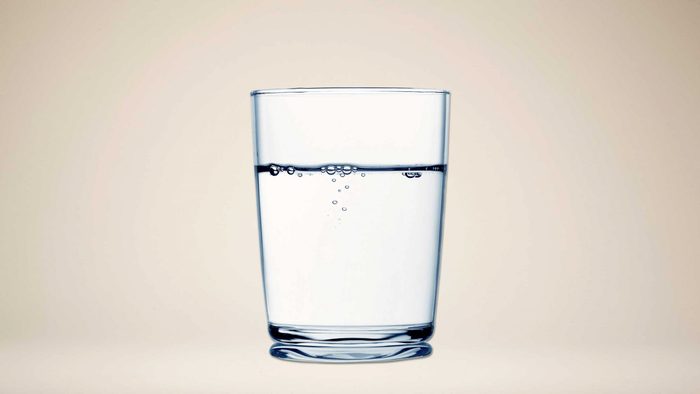
Apple cider vinegar may help tummy troubles
One of the oldest apple cider vinegar (ACV) uses in the book is to take it to fix tummy woes. For an upset stomach, try sipping some apple cider vinegar mixed with water. If you have diarrhea and a bacterial infection is the reason why, apple cider vinegar could help control the problem, thanks to its antibiotic properties. What’s more, some folk remedy experts contend that apple cider vinegar contains pectin, which can help soothe intestinal spasms. Try mixing one or two tablespoons into water or clear juice like apple juice.
Here are the stomach pains you should never ignore.
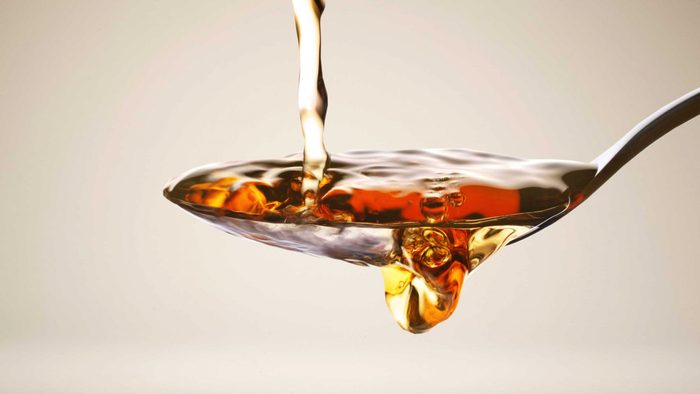
Apple cider vinegar may help cure hiccups
Try a teaspoonful of apple cider vinegar; it might stop a case of hiccups in its tracks. According to a case report in a 2015 issue of the Journal of Palliative Medicine, one patient who developed persistent hiccups the day after undergoing chemotherapy found significant improvement after using vinegar. The journal notes, “Hiccups stopped or decreased in intensity or in rate per minute after sipping vinegar.” While that’s just one person with a specific illness, it might be worth considering. More studies are needed to better determine ACV’s role in reducing hiccups.
Check out more home remedies for hiccups!
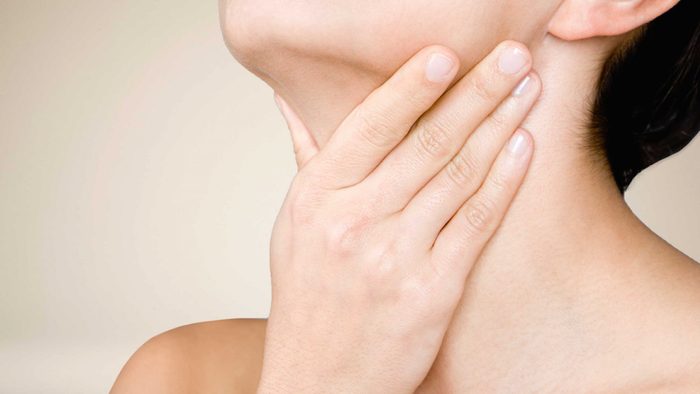
Apple cider vinegar may help soothe a sore throat
As soon as you feel the prickle of a sore throat, consider trying germ-busting apple cider vinegar to help head off the infection. Vinegar creates an acidic environment that has been used since ancient times to kill germs. Modern research suggests it works best when used in the context of food preparation, and it has had mixed results when used to fight germs in people, according to a 2006 review in Medscape General Medicine. (It’s generally not recommended for treating wounds, they say.) However, given its usage in food and home remedies for more than 2000 years, it’s considered safe to ingest, according to the report. Just mix 1/4 cup apple cider vinegar with 1/4 cup warm water and gargle every hour or so.
Learn to spot the early signs of throat cancer.
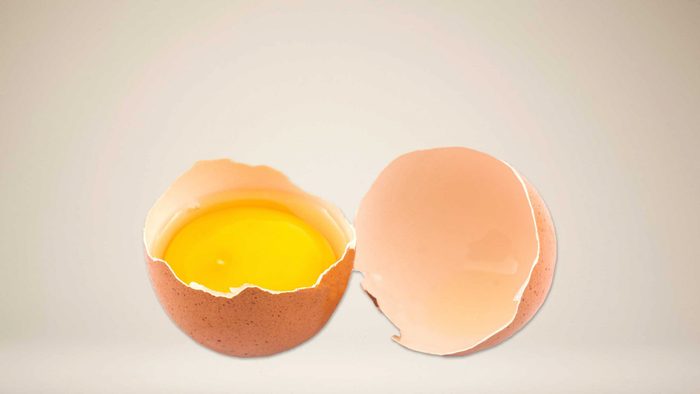
Apple cider vinegar could lower cholesterol
More research is needed to definitively link apple cider vinegar and its capability to lower cholesterol in humans. But one 2006 study published in the British Journal of Nutrition found that the acetic acid in the vinegar lowered total cholesterol in rats. A second study in animals suggested that it might also help lower blood pressure. In a report in Bioscience, Biotechnology, and Biochemistry, rats with high blood pressure given acetic acid had a drop in blood pressure compared with a control group given no vinegar or acetic acid. However, use caution here and talk to your doctor—large amounts of apple cider vinegar may pose a problem for people taking medications such as digoxin or diuretics, which are used to treat heart failure, hypertension, and other conditions.
These are the worst foods for your cholesterol.
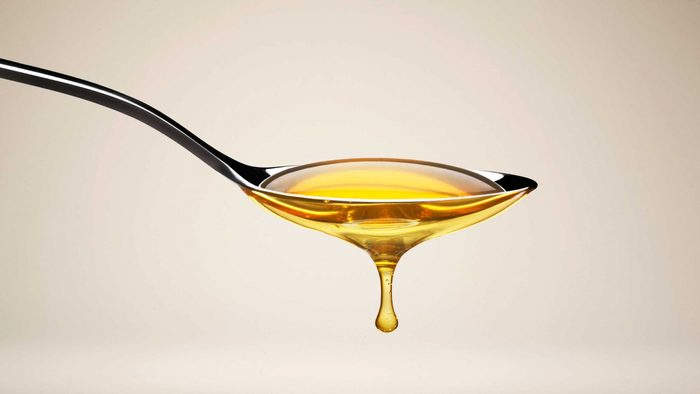
Apple cider vinegar may help prevent indigestion
Sip before eating, especially if you know you’re going to indulge in foods that will make you sorry later. Try this folk remedy: add 1 teaspoon of honey and 1 teaspoon apple cider vinegar to a glass of warm water and drink it 30 minutes before you dine.
You’ll wish you knew these other home remedies for indigestion sooner!
Apple cider vinegar may aid in weight loss
Apple cider vinegar may help you lose weight. According to a 2018 report in the Journal of Functional Foods, apple cider vinegar, when part of a restricted calorie diet, “can be considered as an effective strategy” for reducing visceral fat and helping in a few other health issues. Harvard Medical School experts also point to information that suggests a possible link between vinegar and weight loss: they explain that ACV contains acetic acid, which “has been found to reduce absorption of starches and slow digestion, which can lead to a sensation of a full stomach.” But more research has yet to be done to fully determine the link between weight loss and apple cider vinegar.
Consider trying these tiny diet changes that can help you lose weight.

Apple cider vinegar may help get rid of dandruff
Apple cider vinegar may also help your scalp. The acidity of apple cider vinegar could alter the pH of your scalp, making it harder dandruff-causing conditions to set in. Mix 1/4 cup apple cider vinegar with 1/4 cup water in a spray bottle, and spritz on your scalp. Wrap your head in a towel and let sit for 15 minutes to an hour, then wash your hair as usual. Do this twice a week for best results.
Here’s how to spot the difference between lice and dandruff.

Apple cider vinegar may help clear acne
Apple cider vinegar is a natural toner that can act as a natural home remedy for acne. Its antibacterial properties may help keep acne under control. The malic and lactic acids found in apple cider vinegar might help soften and exfoliate skin, reduce red spots, and balance the pH of your skin. Make sure to do a spot test on your skin first as it might cause skin irritation in some people.
Avoid these habits that practically guarantee your acne will scar.
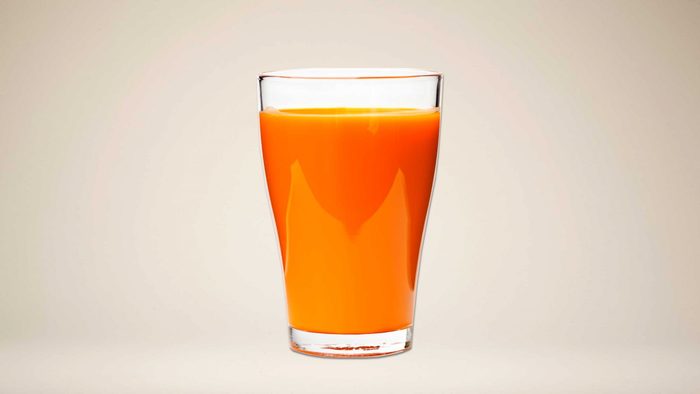
Apple cider vinegar might boost energy
Exercise and stress cause lactic acid to build up in the body, causing fatigue. Interestingly, the amino acids contained in apple cider vinegar may act as an antidote. ACV also contains potassium and enzymes that may relieve that tired feeling. So the next time you’re sluggish, try drinking apple cider vinegar. Add a tablespoon or two of it to a glass of a chilled vegetable drink or to a glass of water to boost your energy.
Check out these other energy-boosting foods!
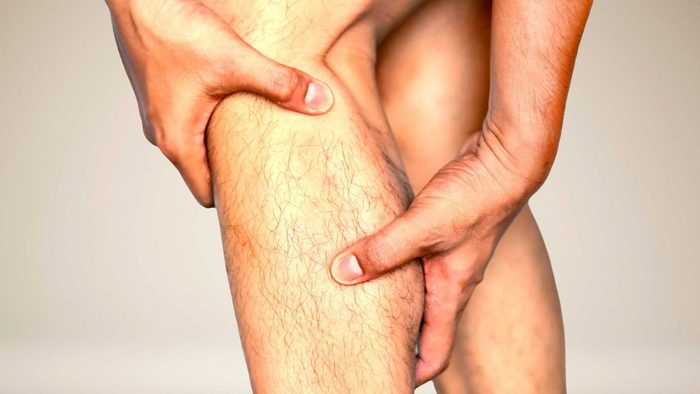
Apple cider vinegar may cut down on nighttime leg cramps
Leg cramps can often be a sign that you’re low in potassium. Since one of the many apple cider vinegar benefits is that contains potassium, one home remedy suggests mixing 2 tablespoons apple cider vinegar and one teaspoon honey to a glass of warm water, then drinking to relieve nighttime leg cramps. Of course, by the time you walk to the kitchen to put the drink together, your cramp is likely to be history—but maybe that’s the point. Keep in mind that large amounts of apple cider vinegar may actually lower potassium levels, so use in moderation.

Apple cider vinegar may banish bad breath
If proper brushing and mouthwash don’t do the trick, try the home remedy of using apple cider vinegar to control bad breath. Dilute some with water, then gargle with it or drink a teaspoon. This may kill odour-causing bacteria. It seems to also have another oral health benefit; a 2015 study published in the Journal of Prosthodontics concluded that “apple cider vinegar showed antifungal properties,” specifically against oral mucous membrane inflammation that can occur under a denture.
Check out these secrets Canadian dentists want you to know.

Apple cider vinegar may whiten teeth
Gargle with apple cider vinegar in the morning. The vinegar helps remove stains, whiten teeth, and kill bacteria in your mouth and gums. Brush as usual after you gargle. You can also brush your teeth with baking soda once a week to help remove stains and whiten your teeth; use it just as you would toothpaste. Be cautious though; too much ACV or baking soda may affect your tooth enamel, which protects against cavities and tooth sensitivity.
Use these tips to protect your teeth from coffee stains.

Apple cider vinegar may fade bruises
Apple cider vinegar has anti-inflammatory properties; dabbing or laying an apple cider vinegar compress on a bruise may help fade the discolouration.
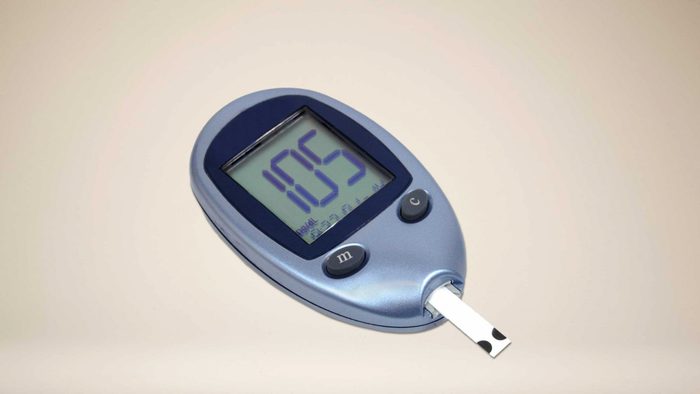
Apple cider vinegar may help control blood sugar
A few swigs of apple cider vinegar could help your blood sugar levels. A 2007 study conducted by Arizona State University researchers found that people with type 2 diabetes who consumed two tablespoons of apple cider vinegar with one ounce of cheese at bedtime had a lower fasting glucose the next morning compared with when they consumed water with their cheese before bed. (The patients weren’t taking insulin but continued to take their oral medications for type 2 diabetes during the study if they were on them.) The scientists concluded that the anti-glycemic effect of the apple cider vinegar may have been particularly beneficial for people who tended to have a relatively high fasting glucose.
Make sure you know the things you shouldn’t do while taking apple cider vinegar.